Electric Vehicles and Battery Technology: A Comprehensive Overview
The automotive industry is undergoing a rapid transformation, driven by the rise of electric vehicles (EVs) and the continuous advancements in battery technology. This shift is fueled by growing concerns about climate change, rising fuel costs, and the allure of cleaner transportation solutions. As EV adoption accelerates, the focus is shifting towards optimizing production processes, enhancing battery performance, and expanding charging infrastructure to cater to the increasing demand.
The Rise of Electric Vehicles
The popularity of EVs has skyrocketed in recent years, with major automakers investing heavily in research and development to produce a wide range of models, from compact city cars to high-performance luxury vehicles. The growing availability of EVs has been driven by several factors:
- Government Incentives: Many governments around the world have introduced subsidies and tax breaks to encourage EV adoption, making them a more affordable option for consumers.
- Environmental Concerns: The growing awareness of climate change and the environmental impact of traditional gasoline-powered vehicles has pushed consumers towards cleaner alternatives.
- Technological Advancements: The continuous advancements in battery technology have significantly improved the range and performance of EVs, making them more practical for everyday use.
- Reduced Running Costs: Electric vehicles offer significant cost savings in the long run, with lower operating expenses compared to gasoline-powered vehicles.
- Enhanced Driving Experience: EVs are known for their quiet operation, smooth acceleration, and responsive handling, providing a different and often more enjoyable driving experience.
Battery Technology: The Heart of Electric Vehicles
The performance and range of an EV are directly tied to its battery technology. Significant progress has been made in recent years, with researchers focusing on enhancing battery capacity, improving energy density, and extending battery life. Key advancements in battery technology include:
- Lithium-Ion Batteries: This dominant battery technology continues to evolve, with improvements in electrode materials, electrolyte solutions, and cell design leading to higher capacity, faster charging, and longer lifespans.
- Solid-State Batteries: These batteries offer significant advantages over lithium-ion batteries, including higher energy density, improved safety, and faster charging times. While still in the development stage, solid-state batteries are expected to revolutionize the EV industry in the coming years.
- Battery Management Systems (BMS): These systems play a crucial role in optimizing battery performance by monitoring and controlling various parameters, such as temperature, voltage, and current. Advanced BMS algorithms improve battery efficiency and extend its lifespan.
Challenges and Opportunities in Battery Production
The rapid growth of the EV market has created a surge in demand for battery materials, leading to concerns about supply chain disruptions and the potential for price fluctuations. Key challenges in battery production include:
- Limited Availability of Critical Materials: The production of EV batteries requires a variety of critical materials, such as lithium, cobalt, nickel, and manganese, which are often sourced from politically unstable regions. Ensuring a stable and sustainable supply chain is crucial for the long-term success of the EV industry.
- Environmental Impact of Battery Production: The mining and processing of battery materials can have significant environmental impacts, including pollution, deforestation, and habitat loss. Sustainable mining practices and recycling initiatives are essential to mitigate these risks.
- Cost of Production: The high cost of battery production is a significant barrier to EV adoption, particularly for lower-income consumers. Scaling up production and reducing manufacturing costs are key to making EVs more affordable for a wider market.
Despite these challenges, significant opportunities exist in the battery production sector. The growing demand for EVs is driving innovation and investment in battery technology, leading to advancements in production processes, recycling technologies, and the development of new materials.
Charging Infrastructure: A Crucial Component
The widespread adoption of EVs requires a robust charging infrastructure to support the increasing number of vehicles on the road. This includes building a network of public charging stations and expanding home charging options. Key considerations in charging infrastructure development include:
- Accessibility: Charging stations need to be strategically located in easily accessible locations, such as shopping malls, gas stations, and public parking garages.
- Charging Speed: Fast-charging technology is crucial for reducing the time spent charging, making EVs more practical for long-distance travel.
- Interoperability: Standardized charging connectors and protocols are necessary to ensure compatibility between different EV models and charging networks.
- Grid Integration: The growing demand for charging power puts pressure on existing electrical grids. Smart charging technologies can help optimize energy consumption and reduce strain on the grid.
Impact on the Automotive Industry
The rise of EVs is transforming the automotive industry in profound ways. Traditional automakers are investing heavily in EV development, while new startups are emerging to challenge the established players. The transition to EVs is driving innovation in areas such as battery technology, autonomous driving, and connected car technologies. Key impacts on the industry include:
- Shift in Manufacturing: Automakers are retooling their factories to produce EVs, leading to changes in production processes and the workforce.
- New Business Models: The rise of subscription-based models and car-sharing services is reshaping the automotive landscape, with a focus on providing mobility solutions rather than traditional car ownership.
- Job Creation: The growth of the EV industry is creating new job opportunities in areas such as battery production, charging infrastructure development, and software engineering.
Conclusion
The transition to electric vehicles is a global phenomenon with far-reaching implications for the automotive industry, energy sector, and the environment. The advancements in battery technology, the expansion of charging infrastructure, and the increasing adoption of EVs are driving a significant shift towards a cleaner and more sustainable transportation future. While challenges remain in terms of battery production and supply chain stability, the continued innovation and investment in this sector offer promising prospects for the future of mobility. As the world moves towards a more electrified future, the impact of EVs will continue to shape the landscape of transportation and beyond.

